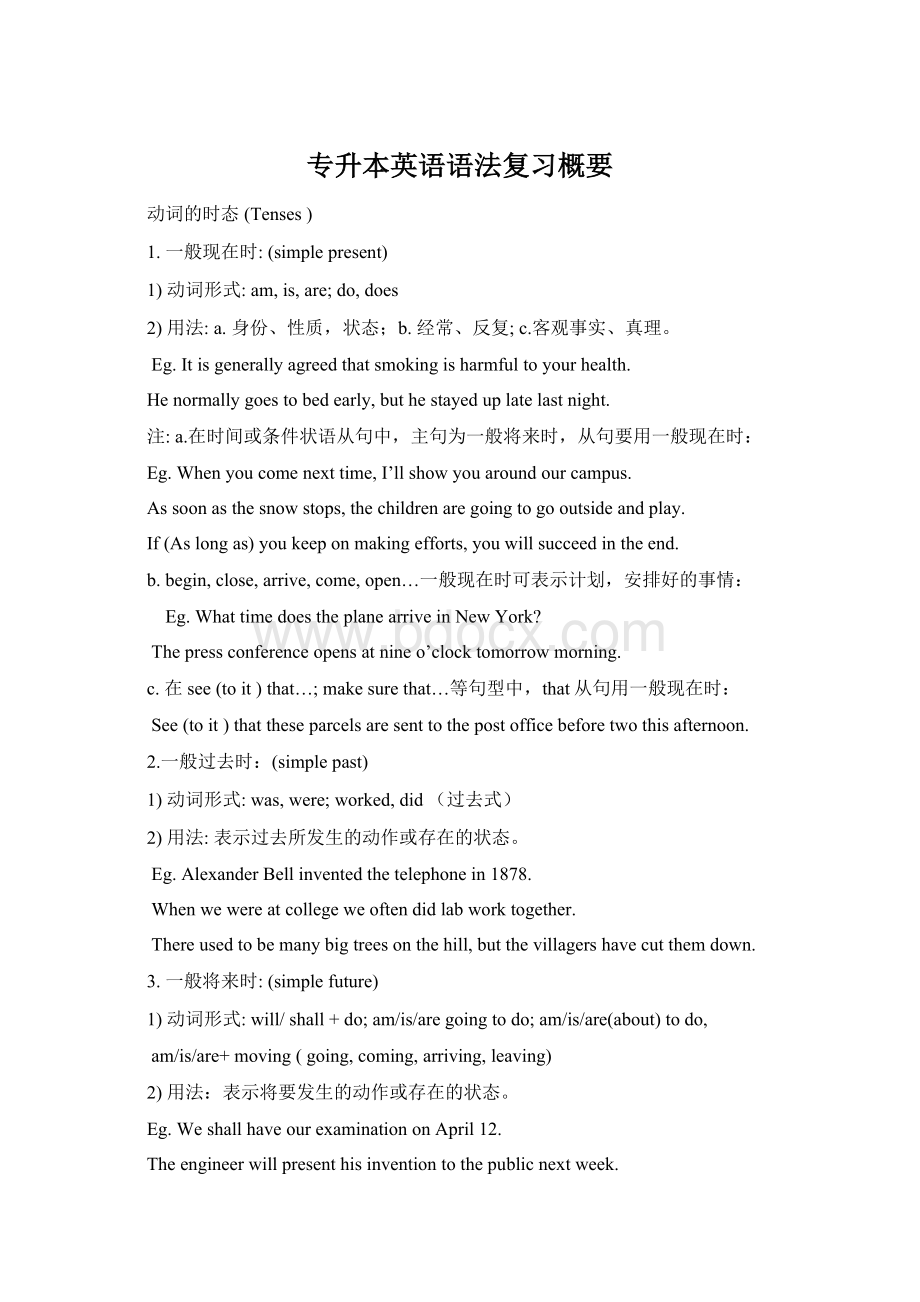专升本英语语法复习概要.docx
《专升本英语语法复习概要.docx》由会员分享,可在线阅读,更多相关《专升本英语语法复习概要.docx(37页珍藏版)》请在冰豆网上搜索。

专升本英语语法复习概要
动词的时态(Tenses)
1.一般现在时:
(simplepresent)
1)动词形式:
am,is,are;do,does
2)用法:
a.身份、性质,状态;b.经常、反复;c.客观事实、真理。
Eg.Itisgenerallyagreedthatsmokingisharmfultoyourhealth.
Henormallygoestobedearly,buthestayeduplatelastnight.
注:
a.在时间或条件状语从句中,主句为一般将来时,从句要用一般现在时:
Eg.When you come next time, I’ll show you around our campus.
Assoonasthesnowstops,thechildrenaregoingtogooutsideandplay.
If(Aslongas)youkeeponmakingefforts,youwillsucceedintheend.
b.begin,close,arrive,come,open…一般现在时可表示计划,安排好的事情:
Eg.WhattimedoestheplanearriveinNewYork?
Thepressconferenceopensatnineo’clocktomorrowmorning.
c.在see(toit)that…;makesurethat…等句型中,that从句用一般现在时:
See(toit)thattheseparcelsaresenttothepostofficebeforetwothisafternoon.
2.一般过去时:
(simplepast)
1)动词形式:
was,were;worked,did(过去式)
2)用法:
表示过去所发生的动作或存在的状态。
Eg.AlexanderBellinventedthetelephonein1878.
Whenwewereatcollegeweoftendidlabworktogether.
Thereusedtobemanybigtreesonthehill,butthevillagershavecutthemdown.
3.一般将来时:
(simplefuture)
1)动词形式:
will/ shall + do;am/is/aregoingtodo;am/is/are(about) todo,
am/is/are+moving(going,coming,arriving,leaving)
2)用法:
表示将要发生的动作或存在的状态。
Eg.WeshallhaveourexaminationonApril12.
Theengineerwillpresenthisinventiontothepublicnextweek.
Morepeoplearegoingtobuyelectricallypoweredcars.
He is to return from Germany nextweek.
Wewerejustabouttogooutwhenitbegantosnow.
MybrotherisleavingforJapanthisevening.
4. 过去将来时:
(pastfuture)
1)动词形式:
should/would+ do;was/ were (about) to + do;
was/ were + doing
2)用法:
表示过去将要,或预计将要发生的动作。
Eg.HehopedthathewouldhavetheopportunitytovisitChinainthenearfuture.
I was told that the press conference was to be held the next day.
I was about to leave when the telephone rang.
He asked me whether I was leaving for Japan.
Wheneverwehadtrouble,hewouldcometohelpus.
5. 现在进行时:
(presentprogressive)1)动词形式:
am/is/are+doing
2)用法:
a.表示此时此刻或现阶段正在发生的动作;
b.Expressingfuturetime(move,leave,come…)(See:
4—2);
c.与always,continuously等状语连用,表示经常发生,或不满,抱怨等:
Eg.Thestudentsarepreparingfortheuniversityentranceexamatpresent.
Heisalwayscomplainingaboutthefood.
6.过去进行时:
(pastprogressive)1)动词形式:
was/were+doing
2)用法:
a..表示过去某时正在发生的动作。
b.go,come,leave,start,begin等的过去进行时表示过去预计的某些事情即将发生。
Eg.Iwaswritingmytermpapeinthelibrarythistimeyesterday.
Shewastoldthattheplanewastakingoffinaquarter.
7.将来进行时:
(futureprogressive)1)动词形式:
shall/will+be+doing
2)用法:
表示将来某时可能正在发生的动作,或表示安排好的事。
Eg.Whatwillyoubedoingthistimetomorrow?
Hewillbeworkingasanengineerinacompanythistimenextyear.
8.现在完成时:
(presentperfect)1)动词形式:
have/has+done(worked)
2)用法:
a:
常用的时间状语:
already,ever,yet,uptonow,sofar,inthepastfewdays
b:
for,since等;since从句中的谓语动词用过去时。
Eg.Mary has (already) gone to Canadatogetherwithherhusband
They have studied English for about ten years(sincetheywenttomiddleschool).
9. 过去完成时:
(pastperfect)1)动词形式:
had+done(worked)
2)用法:
a.表示到过去某时刻或某一行为发生之前已完成的动作,by 或 by the time+过去的时间等结构连用。
Eg.The film had begun when we arrived at the cinema.
By the end of last year, thecorporationhad produced20airplanes.
Hehadworkedinacompanyfortwoyearsbeforehewenttocollege.
Thatwasthethirdtimethathehadvisitedthecityinayear.
b.hope,intend,want,expect的过去完成时形式+todo表示过去未曾实现的希望,打算,意图等。
Eg.IhadwantedtohelpyouwithEnglishbutIhadnotimethen.
Ihadintendedtocallonmyteacheryesterday,butsomeonecametoseemejustwhenIwasabouttoleave.
c.用于nosooner…than,hardly/scarcely…when…等句型中,这些词在句首时,主句要倒装。
Shehadhardlygotonthebuswhenitbegantorain.=Hardlyhadshegoton…
Nosoonerhadheenteredtheclassroomthanthebellrang.
10. 将来完成时:
(futureperfect)1)动词形式:
shall/willhave+done(worked)
2)用法:
表示将来某时刻或某一行为发生之前所完成的动作,常和by 或 by the time+将来的时间等结构连用。
Eg.We shall have finished ourEnglishclasses by the end of this month.
Ihopewe’llhavegottheinstructionreadybeforeyoucomenextMonday.
11.现在完成进行时:
(presentperfectprogressive)1)动词形式:
have/hasbeendoing
2)用法:
用来表示一个动作从过去某时开始,一直延续到现在,并将继续或刚刚结束。
常与表示一段时间的状语连用:
Eg.I have been typinganimportantbusiness letter all this morning.
Shehasbeenworkingonanightshiftforseveralweeks.
Ihavebeenwaitingforhalfanhour,butshestillhasn’tcome.
被动语态(PassiveVoice)
I.形式:
“be + 及物动词的过去分词”。
1)am/is/are+doneDr.GreyhelpsTom.->TomishelpedbyDr.Grey
2)was/weredoneDr.GreyhelpedTom.->TomwashelpedbyDr.Grey.
3)shall/willbe+doneDr.GreywillhelpTom.->TomwillbehelpedbyDr.Grey.
4)am/is/arebeing+doneDr.GreyishelpingTom.->TomisbeinghelpedbyDr.Grey.
5)was/werebeing+doneDr.GreywashelpingTom.->Tomwasbeinghelpedby…
6)have/hasbeen+doneDr.GreyhashelpedTom.->Tomhasbeenhelpedby…
7)hadbeen+doneDr.GreyhadhelpedTom.->Tomhadbeenhelpedby…
8)shall/willhavebeen+doneDr.GreywillhavehelpedTom.->Tomwillhavebeenhelpedby…
9)should/wouldbe+doneDr.GreywouldhelpTom.->Tomwouldbehelpedby…
10)should/wouldhavebeen+doneDr.GreywouldhavehelpedTom.->
Tomwouldhavebeenhelpedby…
Eg.1.Asarule,readersarenotallowedtotakedictionariesoutofthereadingroom.
2.Morethan200collegegraduateshavebeenemployedinthisbigcompanythisyear.
3.Moreandmorehigh-risebuildingsarebeingerectedinmanybigcities.
4.Thethiefwasabouttoleavethestorewhenhewasstoppedandaskedifthearticleunderhisarmhadbeenpaid.
5.Anemployeewhofailstocarryouthisorherassignedtasksintimewillbeconsideredunreliable.
7.Theteachersaidthattheexamresultwouldbeannouncedthenextweek.
II.情态动词的被动语态:
一般式完成式
can/couldcan/could
may/mightmay/might
mustbedonemusthavebeendone
shouldshould
need/oughttoneed/oughtto
Eg.1.Thecauseoftheaccidentmayneverbediscoveredinspiteoftheeffortofthepolice.
2.Thesepillsshouldbekeptoutofreachofchildren.
3.Youshouldn’thavebeentoldabouttheplan.
4.Thehousewasnotveryold.Itoughtnottohavebeenknockeddown.
5.Ifithadn’tbeenforyourhelp,theexperimentcouldn’thavebeenfinishedwithinsuchashortoftime.
III几种特殊动词形式的被动语态:
1.短语动词的被动语态:
vi.+prep.
Eg.Youwillbelookeddownuponifyouneglectyourduty.
Thesedatamustbemadefulluseofinourproduction.
2.带双宾语的动词的被动语态:
Eg.Sheshowedmethepictureshehadpainted.
->Iwasshownthepictureshe’dpainted.
->Thepictureshe’dpaintedwasshown(to)me.
3.带复合宾语的动词的被动语态:
Eg.SomeonesawJoe’sfatherreturnhomeafterdark.
->Joe’sfatherwasseentoreturnhomeafterdark.
III.用法:
a.不知道动作的执行者;b.不必提级;c.强调承受者
Eg.1.Ann’spursewasstolen(byathief)whiledoingshoppinglastSaturday.
2.AlargesumofmoneyhasbeeninvestedinthebuildingofShenyangOlympicCenter.
3.Itissaidthatabigmallwillbebuilthere.
4.Youarerequiredtodotheexercisesafterclass.
5.ThepackagewasmailedbyBob.
6.Endangeredwildlifemustbeprotectedfromextinction.
IV.用主动语态形式表示被动意义。
1.一些动词后面,如:
feel,look,smell,sound,taste,
Eg.1.This type of television set sells well.这种电视机卖得很好。
2.This pen writes smoothly.
3.Theexperimentprovedagreatsuccessintheend.
2.动词want, deserve, need, require,worth+doing表示被动意义:
Eg.This novel is worth reading.这本小说值得一读。
The point deserves mentioning. (The point deserves to be mentioned.)
.Hedeservedpunishingbecausehedidn’tobeythetrafficregulations.
3.不定式(短语)
Eg.TheproblemiseasytoexplainasfarasIknow.
Totellthetruth,thequestionisimpossibletoanswer.
虚拟语气(SubjunctiveMood)
I.概念:
虚拟语气用来表示说话人的主观愿望或假想。
条件句:
1.真实条件句,假设的情况可能发生:
if从句 主句
一般现在时 shall/will+动词原形
Ifhecomes,hewillbringhisviolin.
TellEricifhedoesn’tattendthisexamnow,hewillregretit.
2.非真实条件句,即虚拟条件句。
虚拟条件句表示的是假设的或实际可能性不大的情况,故采用虚拟语气。
II.虚拟条件句(非真实条件句)
1.一般的构成和用法:
if从句 主句
1)同现在事实相反的假设:
did(were) should(would/could/might)+do
2)同过去事实相反的假设:
haddone should(would/could/might)have+done
3)表示对将来的假想:
weretodo should(would/could/might)+do
shoulddo
(did/were)
Eg.IfIwereinyourposition,Iwouldacceptthejob.
Iftherewerenoeconomiccrisis,therecouldn’tbesomanyproblemsintheworldnow.
Ifyouhadaprivateplanewherewouldyougo?
IfIhadknownitwasyourbirthdaylastSaturday,Ishouldhavegotyouapresent.
Ifyourteacherhadnotbeenhereyesterdaywhatwouldyouhavedone?
.
Ifairplaneticketsshouldbecheaper,Ishouldgohomebyairthiswintervacation..
Ifyoushould(wereto)leavetoday,youwouldgettherebySunday.
2.省略if的虚拟条件句,即:
虚拟条件句的倒装。
Eg.Weretheyherenow,theycouldhelpus.
=Iftheywerehere…….
Had I had the money last year,I would have bought the house.
= If I had had the money…….
Shoulditrain,thecropswouldbesaved.
=Wereittorain,….
=Ifitweretorain,…
3.混合条件句:
主句与从句的动作发生在不同的时间,谓语动词的虚拟语气形式因时间不同而不同:
Ifyouhadtoldmewhenyourplanewassupposedtoarrive,Icouldpickyouupattheairport.(从句与过去事实相反,主句与现在事实相反。
)
If I were you, I would have taken his advice.(从句指现在,主句指过去)
Ifitshouldrainforseveraldaysonend,thesportsmeetwillbecalledoff(陈述语气).
“IfIhadn’tpracticedwhenIwasyounger,”themusiciansays,“Iwouldn’tbeabletoplay
4.含蓄虚拟条件句:
有时假设的情况并不以条件从句形式出现,而是用介词短语或其他方式表示,常见的有:
without, but for,otherwise, or,under,suppose…
Eg.Without snowstorm, (=If we therewereno…), I couldhave arrivedmuchearlier..
But for elect